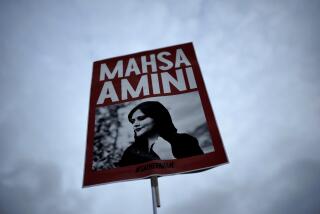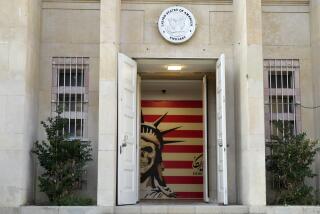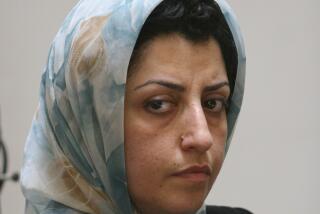Moderate ex-president wins key post in Iran
Former Iranian President Hashemi Rafsanjani rose to a key religious post Tuesday in a move that moderates considered a victory at a time Tehran is facing both international pressure over its nuclear ambitions and U.S. threats to brand its legendary Revolutionary Guard as a terrorist organization.
Rafsanjani, widely regarded as a pragmatist, was elected to head the Assembly of Experts, a clerical body that selects the nation’s supreme religious leader. The new position further enhances his standing and was viewed by many analysts as at least a temporary obstacle to the hard-line conservatives running the government.
News of Rafsanjani’s ascension came during a turbulent week of Iranian politics and indicated that the leadership may be seeking to counter international criticism. President Mahmoud Ahmadinejad has been defiant in promoting the country’s nuclear aspirations, but Tehran also made a leadership change in the Revolutionary Guard and permitted an American scholar facing allegations of espionage to leave the country.
The election of Rafsanjani amid this tenor is “big news as the rational and moderate side of the [regime] will be more empowered,” said Saeed Albehdashti, an activist with the reform-minded Imam Khomeini Followers Front.
Some analysts, however, suggest that Rafsanjani, seen as a clever political operative who understands the West, will have limited political latitude and remain answerable to supreme leader Ayatollah Ali Khamenei, who in recent years has increased his power and his belligerence toward Washington.
Rafsanjani’s remarks immediately before his election to head the assembly underscored the sensitive role he may play in the balance between reformers and hard-liners, especially in protecting the country’s nuclear program, which Washington charges is aimed at producing an atomic bomb.
U.S. officials “made a big issue of the nuclear issue and they are mobilizing public opinion,” Rafsanjani said. “Because of the dangers threatening us, we should pay attention to the supreme leader’s decree for national unity and Islamic cohesion. . . . We should not let ourselves be provoked and give an excuse for the enemy.”
Michel Potocki, an expert on Iran’s legal system and a scholar at the Sorbonne in Paris, said that Rafsanjani “symbolizes a more moderate faction opposed to Ahmadinejad’s faction. But I’m not sure he will be capable of making any important decisions. Everything depends on the supreme leader, after all.”
Rafsanjani won 41 of the votes cast by 86 senior clerics to become chairman of the Assembly of Experts. The next biggest vote-getter was Ayatollah Ahmad Jannati, a religious extremist who garnered 34 of the ballots. Unlike Rafsanjani, Jannati believes the nation’s authority should come from God, not democratic elections.
Rafsanjani also heads another pivotal body, the Expediency Council, which mediates legislative and constitutional matters.
The assembly election followed a weeklong series of intriguing political developments.
Maj. Gen. Mohammed Ali Jafari, once an ally to former reformist President Mohammad Khatami, was named chief of the Revolutionary Guard. The Bush administration had hinted recently that it might designate the military unit, revered in Iran as the protector of the 1979 Islamic Revolution, as a terrorist organization, a move that could freeze its assets. Iran said that U.S. pressure had no bearing on the change of leadership.
On Sunday, American scholar Haleh Esfandiari, 67, was given permission to leave Iran after being detained for eight months, during which she was interrogated and imprisoned for a time. She is accused of working with Washington to encourage a peaceful revolution to overthrow the Iranian government. She has denied the charges, and it was unclear whether she would return to Tehran to face trial.
On Tuesday, an American journalist facing similar charges, Parnaz Azima, was allowed to leave the country.
Some analysts suspect that their release was a sign that Iran did not want to become sidetracked on matters outside its goal of expanding its nuclear program’s ability to enrich uranium. That process can create fuel for power plants or material for nuclear weapons.
“I think a decision has been made to stand ground on the question of enrichment but try to stay clear of side issues that cause international commotion without gaining any advantage for Iran,” said Farideh Farhi, an Iran specialist at the University of Hawaii.
How Rafsanjani’s new political role factors into Iran’s larger international agenda is crucial to pragmatists and moderates. He had been marginalized in recent years, and it remains to be seen whether his seemingly rising stature will have much effect in terms of curtailing the sweeping power of hard-liners.
The Assembly of Experts’ main focus is to select the supreme leader; its power outside that role “has not been taken practically or traditionally serious,” said Ahmad Shirzad, a physicist and political reformist.
But, he added, most of the assembly consists of influential traditionalist religious leaders who lead Friday prayers across the nation. The vote for Rafsanjani “indicates that even the traditionalists of the system are tilting toward moderation and pragmatism,” Shirzad said.
--
Special correspondent Mostaghim reported from Tehran and Times staff writer Fleishman from Cairo. Staff writer Borzou Daragahi in Paris contributed to this report.
More to Read
Start your day right
Sign up for Essential California for news, features and recommendations from the L.A. Times and beyond in your inbox six days a week.
You may occasionally receive promotional content from the Los Angeles Times.







